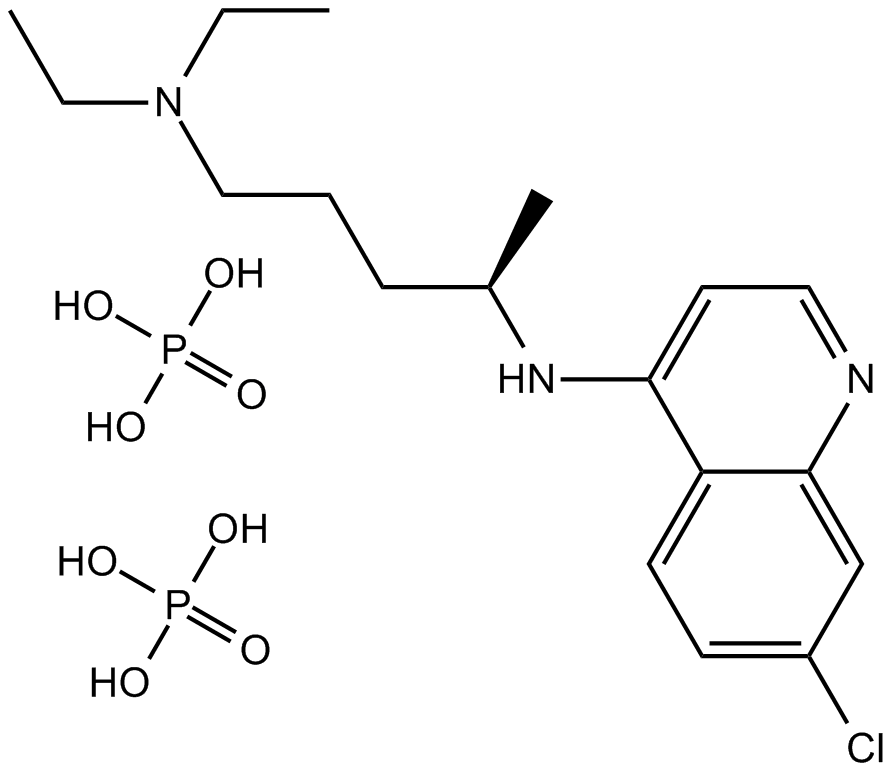Chloroquine diphosphate (Synonyms: DL-Chloroquine, NSC 14050) |
| Catalog No.GC10295 |
Chloroquine diphosphate is an antimalarial and anti-inflammatory agent widely used to treat malaria and rheumatoid arthritis.
Products are for research use only. Not for human use. We do not sell to patients.

Cas No.: 50-63-5
Sample solution is provided at 25 µL, 10mM.
Chloroquine diphosphate is used as an antimalarial drug and also functions to increase sensitivity of tumor cells to radiation and chemotherapy via inducing autophagy [1].
Chloroquine diphosphate has been reported as an adjuvant for radiation and chemotherapy for inducing cell autophagy to anti-cancer cells proliferation or metastasis [2]. The mechanism of chloroquine diphosphate inducing cells autophagy is arresting cells in G1, up-regulates the expression of p27 and p53 while down-regulates the expression of CDK2 and cyclin D1 [3].
Apart from anti-malarial, chloroquine diphosphate also has long been reported functioning in cell apoptosis. Pretreated CNE-2 human nasopharyngeal carcinoma cells with chloroquine diphosphate enhanced ionizing radiation induced cell apoptosis via increasing cells autophagic ratio [4]. When treated with mouse breast cancer 4T1 cells, chloroquine diphosphate treatment inhibited cellular proliferation and viability which resulted in cells apoptosis in a time- and dose- dependent manner [2]. In human colon cancer DLD-1 cells, combination of 5-FU and chloroquine diphosphate could inhibit cells proliferation via inducing autophagy [3].
In mouse model with 4T1 cells subcutaneous xenograft, chloroquine diphosphate treatment significantly inhibited tumor growth and tumor cells metastasis to the lung, thus enhanced the mice survival [2]. In BALB/c mice injected with colon26 cells subcutaneously, chloroquine diphosphate cooperated with 5-FU significantly enhanced the inhibition of tumor growth induced by 5-FU through increasing the ratio of apoptotic cells [5].
References:
[1]. Gewirtz, D.A., An autophagic switch in the response of tumor cells to radiation and chemotherapy. Biochem Pharmacol, 2014. 90(3): p. 208-11.
[2]. Jiang, P.D., et al., Antitumor and antimetastatic activities of chloroquine diphosphate in a murine model of breast cancer. Biomed Pharmacother, 2010. 64(9): p. 609-14.
[3]. Choi, J.H., et al., Chloroquine enhances the chemotherapeutic activity of 5-fluorouracil in a colon cancer cell line via cell cycle alteration. APMIS, 2012. 120(7): p. 597-604.
[4]. Zhou, Z.R., et al., Poly(ADP-ribose) polymerase-1 regulates the mechanism of irradiation-induced CNE-2 human nasopharyngeal carcinoma cell autophagy and inhibition of autophagy contributes to the radiation sensitization of CNE-2 cells. Oncol Rep, 2013. 29(6): p. 2498-506.
[5]. Sasaki, K., et al., Resistance of colon cancer to 5-fluorouracil may be overcome by combination with chloroquine, an in vivo study. Anticancer Drugs, 2012. 23(7): p. 675-82.
Average Rating: 5 (Based on Reviews and 25 reference(s) in Google Scholar.)
GLPBIO products are for RESEARCH USE ONLY. Please make sure your review or question is research based.
Required fields are marked with *




